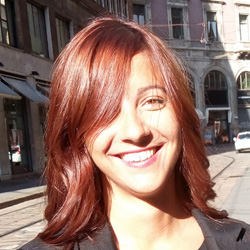
Your complimentary articles
You’ve read one of your four complimentary articles for this month.
You can read four articles free per month. To have complete access to the thousands of philosophy articles on this site, please
New Realism
Sarah De Sanctis
Manuel Carta interviews Maurizio Ferraris’s translator into English.
Your education was mainly focused on literature. How did you discover philosophy?
To be honest, my training in philosophy dates back to high school. I also did a module in Aesthetics – Descartes, Kant and Husserl – during my BA, but that was it at university. I have been cultivating philosophy mainly because of my personal interest in the subject, but I have to say my high school teacher was absolutely exceptional – most people assume I have a degree in philosophy – they can’t tell! So thank you, Maria Teresa Cazzaniga. It’s been incredibly hard and challenging, but worth it!
Do you feel like an academic philosopher? If not, what do you think about academia?
That’s a tricky question. I do not consider myself an academic, even though I work in academia. That’s because I find that academia has become increasingly sterile over the years: it seems to me that a select group of people speak to each other pretty much for the sake of it. I read somewhere that an academic essay is read by five people on average. What does that tell us? Personally, I believe that knowledge should be spread, and that part of the mission of academics should be to make people interested, to try and make people think about things in a different way. But this can’t be achieved as long as academic philosophy remains so unbearably technical, and, let’s face it, boring. I’m a big fan of vulgarisation: I’d rather simplify and perhaps bastardise a concept, but make it known and debated, than talk about it in a purist way to five other people on the entire planet!

On this topic, there’s a website/study tool that I find absolutely brilliant. It’s called Shmoop, and it’s managed by PhD students from prestigious American universities – Harvard and the like. Shmoop addresses great works of literature in a witty and funny language, in a way that’s able to arouse interest even in the most bored and lazy students – it even worked with my brother! That, to me, is a real achievement!
You are a professional translator. In what way has this given you extra skills to work on your philosophical research?
In order to translate a text you have to read it extra-carefully, and think about it a lot. Any good translator is an excellent reader – the most demanding reader any text will ever get. You have to assess a text, and the ideas it expresses, almost word by word. So the extra skill I developed is attention to detail. Also, I have found that writers whose language is Latin-based – so French, Spanish and, of course, Italian – tend to write in a rather complex, Proustian way – with very long and convoluted sentences. Translating that into English implies a process of simplification and adjustment to a language that, by its nature, is very logical and ‘to the point’, if you know what I mean. This links back to what I was just saying, namely my very personal mission to make philosophy easier to understand, and, hopefully, less ‘scary’.
Can you tell us about your interest in the novelist David Foster Wallace? What’s the link between his writing and New Realism?
David Foster Wallace is surely one of my favourite writers. I was working on my PhD project proposal on his writing and philosophy when I attended the famous ‘Prospects for New Realism’ conference in Bonn in 2012. I remember listening to the speakers and thinking, “Hold on: this is exactly what Foster Wallace was trying to do!” New Realism, broadly understood as a paradigm shift in contemporary thought, does not disregard postmodernism and what it stood for. It incorporates postmodernism’s ideas and styles, but wants to move forward and recover more down-to-earth and sincere topics. Hence it deals with lived reality rather than responses to culture, with objects rather than thought, and so forth. David Foster Wallace’s work seems to be the perfect literary expression of this: he dared to back away from ironic watching and shunned self-consciousness and fashionable ennui, choosing to deal instead with “plain old untrendy human troubles and emotions … with reverence and conviction.” His declared aim was to write in a way that would be “morally passionate, and passionately moral.” Foster Wallace utterly scorned metanarrativity – writing which references itself within a piece of fiction, and which is the postmodern literary trope par excellence – seeing literature as a “living transaction between humans” and not as a playground for metanarrative show-offs. He still did not reject postmodernism as a whole, to go back to a nineteenth century type of realism. Instead, he adopted realism’s techniques, albeit with ethical-realist aims. This is exactly what New Realism is trying to do in philosophical terms.
As an Italian, can you tell us which Italian philosophers are most worth knowing?
Well, apart from Maurizio Ferraris of course, there is a promising young philosopher called Leonardo Caffo, who is also a friend of mine. He developed some interesting theories in the field of animal philosophy. His book Only for Them has just been published by Mimesis International. Also, together with art critic Valentina Sonzogni, he wrote An Art for the Other, published by Lantern Books. It’s an epistolary reflection on animals in art, philosophy and our everyday world, which manages to talk about a tricky subject in a very personal and engaging way. It is a fascinating read. I do recommend it.
• Manuel Carta has an MA in Philosophy from the University of Pisa.









